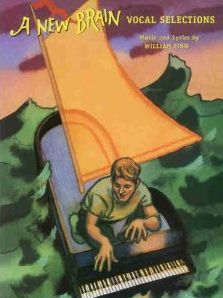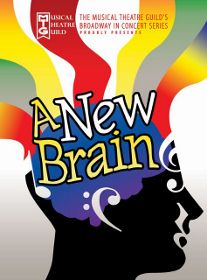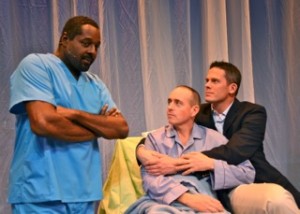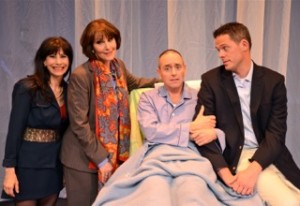ONE FROGGY EVENING
Once again, Musical Theatre Guild (MTG), a company of professional performers who present concert-staged readings, has produced a stellar offering of a rarely-seen musical – William Finn’s A New Brain – that elucidated why it is rarely produced. More important, MTG also revealed how a musical’s spotty construction can be overcome with an assemblage of bravura talent, a full orchestra, deceptively simple direction and imaginative choreography. Whether or not the semi-autobiographical tale can enjoy a successful, fully-staged, long-term run is highly debatable, but if MTG were to bring back their production of A New Brain (which played just one night at the Alex Theatre), I would hawk tickets until the place was SRO.
The plot is simple: Songwriter Gordon Schwinn is stressing out: he wants to compose for Broadway, but he took a job writing songs for the children’s show Mr. Bungee’s Lily Pad. Unfortunately, he can’t even complete the “Yes” song requested by his boss, who happens to be the Mister Rogers-esque frog himself, Mr. Bungee. While at lunch with his friend Rhoda, Gordon collapses and is rushed to the hospital. The brain condition he has requires surgery, which may cause a coma or even death. Knowing he may not make it out of the hospital, Gordon is hell bent on finishing one last great song, instead of spending quality time with his lover Roger or his mom Mimi. The rest of the musical contains recollections, an MRI procedure, a kooky hospital staff, a homeless woman, and frog hallucinations, but not an arc.
 When A New Brain opened at Lincoln Center in 1998, I couldn’t understand why the reviews were so higgledy-piggledy. True, I hadn’t actually seen the production, but the original cast recording had me hooked. I was chomping at the bit to see why Finn’s musical (with book by frequent co-librettist James Lapine) went the way of the cultists. Now, because of the laudable MTG, I know: A New Brain, for all of its interrelated characters, is actually a cabaret.
When A New Brain opened at Lincoln Center in 1998, I couldn’t understand why the reviews were so higgledy-piggledy. True, I hadn’t actually seen the production, but the original cast recording had me hooked. I was chomping at the bit to see why Finn’s musical (with book by frequent co-librettist James Lapine) went the way of the cultists. Now, because of the laudable MTG, I know: A New Brain, for all of its interrelated characters, is actually a cabaret.
The musical’s theme is clear and more than enough to fuel a theater piece: it’s about getting a second chance, one that creates a new outlook on life. Finn himself acknowledges that “everything has changed, but nothing’s changed” as a result of his own brush with death (Finn was diagnosed with arteriovenous malformation, or AVM, in his brain stem in 1992). As one who was once near death, I agree with Finn’s sentiment. Unfortunately, that’s not a very strong choice for a musical. And how does the composer emotionally heighten such a namby-pamby declaration at the end of the show? Gordon sings a new version of the children’s song he was trying to construct before his malady began, now entitled, “I Feel So Much Spring.” It’s a lovely tune about gratitude, simplicity and fresh beginnings, but when Gordon is joined by the entire cast in the number, we realize that neither he nor those associated with his plight have had any major revelations or breakthroughs. As such, A New Brain is a journey that is only as good as the last song we hear, just like a cabaret.
Finn is best known for his quirky, poignant Falsettos and the light-hearted The 25th Annual Putnam County Spelling Bee, both of which saw healthy runs on Broadway. Falsettos, truly one of the greatest musicals since 1980, explores both the tricky subject matter of AIDS and the discords in gay and straight relationships; the music and lyrics are exhilarating, bouncy, pointed, accessible, heart-breaking and wholly original; in addition, every song dictates character or plot development. Moreover, there is a Sondheim-esque pressure-cooker feel to the music which creates a palpable tension.
The songs in A New Brain are a mixed bag lyrically, even as the melodies are generally catchy and melodic. Finn’s rhymes are always meticulous, but the words don’t always reach out and grab you like some of his other work. Still, even within this pseudo-song-cycle context, there is an underlying strength to the musical: it is heartfelt and life-affirming. What surprised me most about MTG’s production is that they managed to intensify the musical’s main strength with the amazing talent on hand.
The best number in the show is the wistful ballad, “I’d Rather Be Sailing,” sung by Gordon’s lover Roger; Stuart Ambrose gave the song just the right combination of restrained passion, love, and superb breath control – all fitting to the character of Roger. Michael A. Shepperd was hysterical as Richard, the hyperbolic black nurse who sees himself as “Poor, Unsuccessful and Fat.” Jill Marie Burke blasted the roof off of the Alex as Lisa, the homeless woman who counsels Roger on the day of Gordon’s surgery. Her big number is called “Change” – she doesn’t want sympathy, just coins; Finn, of course, gives a double meaning to the word “change,” a theme which was resoundingly more successful in Tony Kushner’s Caroline, or Change.
Joshua Finkel was inspired as Mr. Bungee, nailing both the temperamental, pushy boss and the neighborly host of a kid’s television program. Eileen Barnett had just the right balance of motherly suffocation and plaintive suffering as Mimi, Gordon’s mom; she could do no better with “The Music Still Plays On,” a ballad about the men that came in and out of her life – unfortunately, the lyrics never really capture the woman’s personal story. Rounding out the cast were Eydie Alyson as Rhoda, Melissa Fahn as the bitchy nurse Nancy, David Holmes as the doctor, and Eric McEwen as the Minister, a role which is so underdeveloped that it felt like the character was created for set changes and vocal filler.
Not only did Kevin McMahon fully fit the shoes of Gordon, he was in fine voice and barely looked at his script. McMahon took time off his current Wicked tour to play a role that mirrored his own life, as he underwent successful brain surgery himself four years ago.
Director Todd Nielsen is a master of effortlessness minimalism; whereas other director/choreographers stage shows within an inch of their lives, Nielsen allows his shows to breathe. I’m not kidding when I report that the audience broke into spontaneous applause when some background characters started trucking. An angel gave extra money to this production so that master musical director Gerald Sternbach was able to have every musician he needed to execute the original orchestrations; Sternbach was simply possessed. But then again, so is the Musical Theatre Guild possessed with the devotion to preserve the unique American art form of musical theatre.
show photos by Alan Weston
A New Brain
Musical Theatre Guild
Alex Theatre in Glendale
played on April 16, 2012
MTG’s next season includes Death Takes a Holiday,
Call Me Madam, Chess, A Catered Affair and Girl Crazy
for tickets and show info, visit MTG




